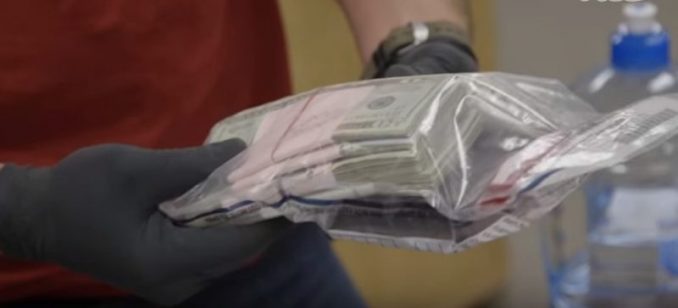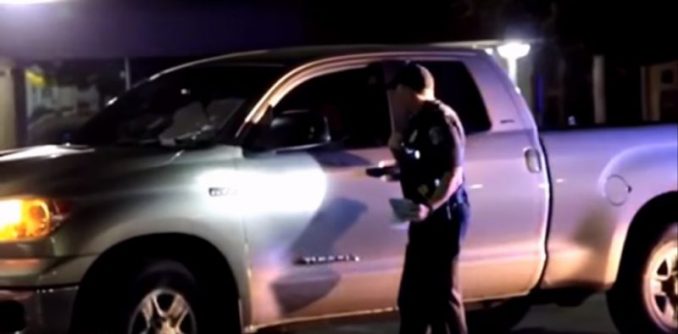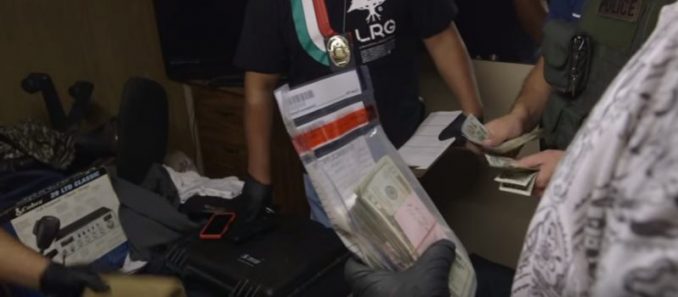The police stopped a couple who were carrying $107,000 in cash and seized the “crime” money. It appears that it was legally theirs. The couple went to get it back. But, that’s when their problems truly began.

Adam and Jennifer Perry were pulled over for speeding in Henry County, Illinois, where cops took more than $107,000 from the married Massachusetts couple, who they at first believed were involved in criminal activity. Even years after the seizure, no charges were ever submitted. Still, the couple’s cash, which they declare was made lawfully, has never been returned because of the civil forfeiture law.
After pulling them over for the typical traffic stop, the Illinois cops searched the couple’s Toyota Tundra with the help of a K-9 and discovered a suitcase containing $102,000 in cash, according to the Dispatch-Argus. Another $5,520 was discovered in Jennifer’s wallet. no drugs were discovered, and the authorities suspected the Perrys of criminal activity, so they took their money as well as their truck.

Obviously, the Perrys — who were en route to a medical consultation in Salt Lake City, Utah, where Adam was visiting a hearing professional — firmly insisted that they didn’t do anything illegal. They described that the cash was from insurance coverage settlements, car sales, individual earnings, disability benefits, and other legal methods.
After hours of questioning however no proof of criminal activity, the police ultimately let the Perrys go. But they utilized civil forfeiture law to keep every dollar in the truck, as well as the automobile itself, and even Mrs. Perry’s wedding event rings, without law enforcement having to push even a single charge, under just the presumption that the cash and car were connected to criminal activity.

Years later, the Perrys were still left battling to get their home back after a federal judge required that the couple show how they got the cash. Adam Perry argued that not only had he and his wife supplied a description, but they should not have to show their innocence. Rather, it must be the police and district attorneys who require to show guilt. But contrary to all ethics and logic, that’s not how civil forfeit works.
“This is not Nazi Germany where you can treat people like this,” Mr. Perry wrote in a letter to the federal judge. “You should be treating me innocent until proven guilty and not denying me my right to counsel,” Adam added. “I even begged and said please just give me my truck back and you can keep the money and I’ll walk away from it. Still denied,” he continued. “You don’t understand the emotional, physical and financial terrorism you have caused.”

The judge didn’t concur. Four years of battling later, the federal judge approved a federal demand to keep the money discovered in the Ashburnham, Massachusetts, couple’s car throughout the traffic stop.
According to Mass Live, “Judge Sara Darrow, of the U.S. District Court for the Central District of Illinois, said the couple failed to answer questions about where the funds came from,” as she granted the request to permanently reward the funds to the government.
The federal civil forfeiture program — likewise called the civil asset forfeiture, civil judicial loss, or occasional civil seizure — is the questionable legal process in which police officers take possessions from individuals suspected of being associated with a criminal offense or unlawful activity without always charging the owners with a crime.

“While civil procedure, as opposed to criminal procedure, generally involves a dispute between two private citizens, civil forfeiture involves a dispute between law enforcement and property such as a pile of cash or a house or a boat, such that the thing is suspected of being involved in a crime. To get back the seized property, owners must prove it was not involved in criminal activity,” Wikipedia explains.
It has actually been a really fiercely disputed concern, throughout numerous administrations, with the law and its oversight frequently altering. In 2015, the “adoptive forfeiture,” which occurs “when a state or local law enforcement agency seizes property pursuant to state law and requests that a federal agency take the seized asset and forfeit it under federal law,” was ended due to abuse.
As Wikipedia further explains, “Although states proceeded to curtail the powers of police to seize assets, actions by the Justice Department in July 2017 have sought to reinstate police seizure powers to raise funding for federal agencies and local law enforcement.”

Explaining the pros and cons to the program, Wiki continues, “Proponents see civil forfeiture as a powerful tool to thwart criminal organizations involved in the illegal drug trade, with $12 billion annual profits, since it allows authorities to seize cash and other assets, from narcotics trafficking.
They also argue that it is an efficient method since it allows law enforcement agencies to use these seized proceeds to further battle illegal activity, that is, directly converting value obtained from illegal items for law enforcement purposes by harming criminals economically while helping law enforcement financially.”
Of course, “Critics argue that innocent owners can become entangled in the process to the extent that their right to property is violated, with few legal protections and due process rules to protect them in situations where they are presumed guilty instead of being presumed innocent,” as Wiki explains. “Further, critics argue that the incentives lead to corruption and law enforcement misbehavior. There is consensus that abuses have happened but disagreement about their extent as well as whether the overall benefits to society are worth the cost of the instances of abuse.”
The advantages of the program can be discussed and the guilt or innocence of the Perrys is unknown, it would definitely appear that the Perrys did end up being caught up in the questionable procedure and that their rights were violated as their guilt was assumed and they were left with the burden of proving their innocence.
H/T TapHaps



















